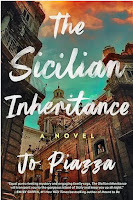Tuesday, March 26, 2024
A Great Country by Shilpi Somaya Gowda
Monday, March 25, 2024
Mystery and Historical fiction ...
Switching between time periods seems to be a favorite vehicle of several recent mysteries, including:
HOW TO SOLVE YOUR OWN MURDER by Kristen Perrin is the top pick on the LibraryReads list for March and author Perrin’s adult fiction debut offers a diverting mystery set in an English country village. The events toggle between two time periods: mid 1960s and present day. In the past, teenager Francis and friends Emily and Rose receive a disturbing fortune about a death – it takes 60 years for the prophecy to be realized and Frances’ great niece, Annie Adams, sets out to solve the puzzle and inherit the estate. Both story lines are suspenseful with multiple complex characters and troubling occurrences. Despite the many suspects, though, there were abundant clues and the murderer was telegraphed fairly early. HOW TO SOLVE YOUR OWN MURDER also received a starred review from Booklist and indications are that cozy mystery fans will have more of Annie’s adventures to look forward to in the future. THE SICILIAN INHERITANCE by Jo Piazza contrasts events in the 1920s and today in the Sicilian countryside. Serafina Marsala is an independently minded woman who learns to be a healer after her husband heads to America in the early part of the last century. On her own, Serafina was treated with suspicion and ultimately seen as a brutalized murder victim; her descendant and namesake, Sara Marsala, arrives to claim a property inheritance and to try to set her own troubled life back on track. There is much Sara does not understand about local customs and her innkeeper, Giusy, is often an unreliable source. Readers will empathize with Serafina’s long ago efforts to use her medical skills and to help the villagers despite many prejudices. A much weaker character who yearns to be more of a role model for her young daughter, Sara, too, faces grave physical danger. Filled with vivid descriptions of Sicilian life and culture, THE SICILIAN INHERITANCE received a starred review from Booklist.
Thursday, March 21, 2024
On the Move by Abrahm Lustgarten
ON THE MOVE by Abrahm Lustgarten is subtitled “The
Overheating Earth and the Uprooting of America.” Lustgarten, an investigative
journalist for ProPublica, points to several main factors that have already
begun to impact movement in the USA: wildfires; flooding (especially in coastal
regions); extreme heat or humidity; and droughts. He vividly cites research
such as: “Scientists estimate that as many as one in three people on the planet
will find the places they live unmanageably hot or dry by 2070.” In the USA
alone, he notes that five million climate migrants “could translate to a shift
of fifty million additional people by the end of the century.” His perspective –
that our lack of preparation for climate change will intensify differences
between rich and poor – is supported by his extensive and disturbing research.
For example, he notes that “a
study published in 2021 in the journal Cities examining the resilience policies of the
101 largest U.S. cities found that 31 of them had no policies whatsoever, and
that only 33 had conducted any sort of evaluation of their climate
vulnerability.” Lustgarten argues that even when change is attempted (as described
in Atlanta or New Orleans), it often results in waves of gentrification,
further separating communities. He goes so far as to say that “Climate change,
however, is about to make the differences between winners and losers so extreme
that they will threaten the underpinnings of the American economy and security.”
Is it any wonder that we see declines in the happiness scale, especially
for younger Americans? Lustgarten
attempts to balance this by including a more uplifting section involving a
discussion with an urban planner in Detroit who “recognizes that people are
often prejudiced against refugees…. [and asks] what's a narrative that might
galvanize people to see opportunity in welcoming outsiders?” Much to consider
and to investigate further; ON THE MOVE contains multiple pages of notes and bibliographic references, plus an
index. Other recent
texts on this high interest topic of climate migration include Jack Bittle’s The Great
Displacement and Nomad Century by Gaia Vince.
Wednesday, March 20, 2024
Third Millennium Thinking
Tuesday, March 19, 2024
The Anxious Generation by Jonathan Haidt
THE ANXIOUS GENERATION by Jonathan Haidt, Thomas Cooley Professor of Ethical Leadership at New York University’s Stern School of Business, explains “How the Great Rewiring of Childhood Is Causing an Epidemic of Mental Illness.” I have referenced Haidt’s writings multiple times over the past few years, including his work with Jean Twenge and articles in diverse publications like The Wall Street Journal and The Atlantic. In his newest book, he focuses on Gen Z (those born after 1995) and argues that the decline in play-based childhood and its being supplanted by device-based activities have had an extremely detrimental impact on this cohort. His own summary states: “my central claim in this book is that these two trends -- overprotection in the real world and under protection in the virtual world -- are the major reasons why children born after 1995 became ‘the anxious generation’.” THE ANXIOUS GENERATION has four main parts; one looks at facts about teen mental health since 2010; another explores the changes in parenting style as it became increasingly overprotective and fearful; next, Haidt describes the ways phone-based childhood disrupts development (sleep and social deprivation, lowering attention spans; and addiction).
The final
section provides research-based ideas on steps to take, especially his four
“foundational” reforms: more unsupervised play; no smartphones before high
school; no social media before age 16; and phone free schools. That sounds
unrealistic, doesn’t it? Haidt draws on his social psychology background to
explain collective action problems like the case where a few students have
phones and/or social media accounts and then put pressure on their peers, who
in turn pressure their parents. He cites examples of voluntary coordination
like the group Wait Until 8th and advocates for technological solutions
(e.g., lockable pouches, better basic phones) and increased regulation. Several
chapters deal with what government, tech companies, schools, parents, and young
people can do. He condenses his recommendations to Speak Up and Link Up,
ironically providing many resources via an online portal: AnxiousGeneration.com. Deeply
researched and fascinating – THE ANXIOUS
GENERATION will be on our
shelves soon.
Monday, March 18, 2024
The Breakthrough Years by Ellen Galinsky
THE BREAKTHROUGH YEARS is the latest parenting text from Ellen Galinsky, a well-respected researcher and prolific author who is currently President of Families and Work Institute. In this lengthy (560 pages) book, she presents “A New Scientific Framework for Raising Thriving Teens.” As she begins to outline the structure of her book, she highlights pleas from teens to address questions like: Why don’t adults understand us? and Why do adults have such negative views of teenagers? This echoes the sentiments expressed in the recently published Underestimated, although that text takes a decidedly less scientific tone. Galinsky notes five main messages which teens want to share: (1) Understand our development; (2) Listen and talk with us, not at us; (3) Don’t stereotype us; (4) We are trying to understand ourselves and our needs; and (5) We want to learn life and learning skills. Galinsky describes relevant research, including copious quotes from adolescents (ages nine to nineteen, per her definition). For example, she discusses emotional regulation, how adolescents learn to manage emotions, even the benefit of strong emotions, and then continues with a look at “the vital connection between rewards, motivation, and learning.” Perhaps the most helpful, though, are Galinsky’s thoughtful suggestions like those she offers for rethinking adolescence and seven reasons (e.g., protective instinct, fear, etc.) for why we experience difficulty in reframing negative attitudes towards teens.
For each of the five key messages listed above, she repeats a pattern of quotes from teens; reflection on the message (with comments from adults and parents); and then a detailed and segmented overview of relevant science and summary lists (e.g., four components of foundational executive function skills) and proposed actions. The text’s layout with multiple subheadings, italics and bold typeface aids the reader’s comprehension. Frankly, there is SO much here to digest and apply that Galinsky’s text could easily provide a valuable yearlong one book-one school read. Roughly twenty percent is devoted to notes and bibliographic citations; she also provides an amazing list of the dozens of researchers and thought leaders interviewed. THE BREAKTHROUGH YEARS received a starred review from Publishers Weekly (“Overflowing with insight backed by scientific rigor, this is an essential companion for parents of adolescents.”) and very positive comments from experts like Lisa Damour, Angela Duckworth, Kenneth Ginsburg, Adam Grant, and Daniel J. Siegel. PLEASE NOTE: Family Action Network is hosting a Zoom session with Ellen Galinsky on Tuesday, April 16th at 7:00 pm. Watch their website for details on how to register.
Added: Recording of the program (about an hour) is now available.
Welcome to Continuing the Conversation!
We are in the midst of migrating book reviews to this new blog. To see past reveiws and comments, please visit Book Talk ... A Conversation...
-
THE LISTENERS is a mix of historical fiction, sprinkled with magic, and romance as well as being the adult debut from the best-selling youn...
-
THE ENGLISH MASTERPIECE by Katherine Reay is described by the publisher as “perfect for fans of Kate Quinn and Ariel Lawhon .” Given that ...
-
I CHEERFULLY REFUSE by Leif Enger has a beautiful, eye-catching cover which reflects the many layers involved in this latest story from an ...









